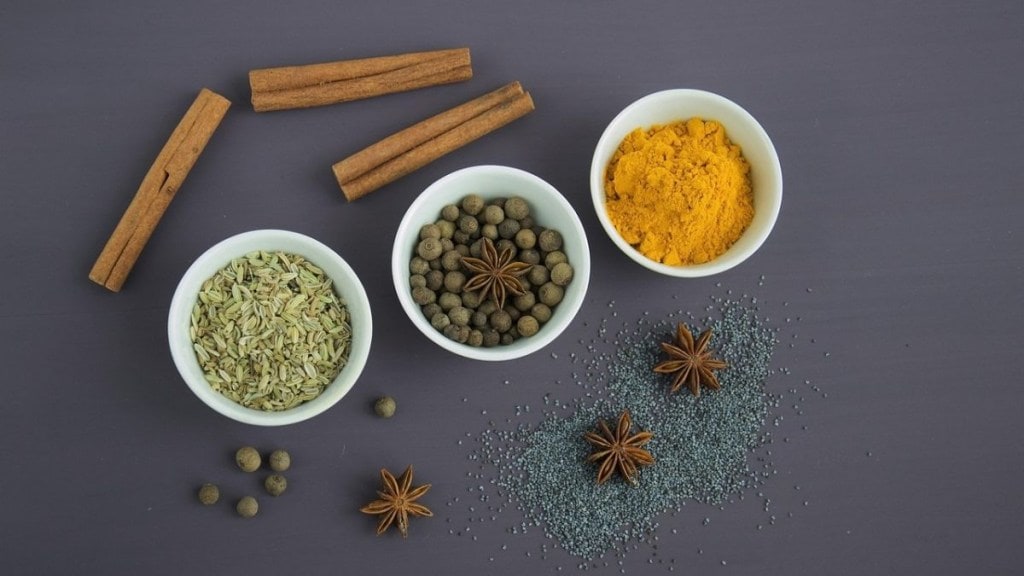Cancer cases are growing exponentially. The WHO predicts a 77% increase in overall cancer cases by 2050, rising from 20 million in 2022 to 35 million by 2050. While genetic and family risk factors can’t be controlled, tweaking your lifestyle choices can help lower risk to some extent. Ayurveda, the ancient Indian medicinal system, recommends a range of herbs and spices for cancer prevention. The Financial Express.com spoke to Dr Partap Chauhan, Ayurvedaacharya and author, Founder & Director of Jiva Ayurveda to know about commonly used anti-cancer herbs and spices that are easy to incorporate in daily diet.
Turmeric
The golden spice has been trusted as a traditional medicine in ancient Indian and Chinese medicinal systems for time immemorial. Turmeric or Haldi has been traditionally used in Ayurveda to treat digestive disorders, skin and joint issues, respiratory problems etc. A key compound in the ancient spice – curcumin has the ability to inhibit cancer development and progression in different kinds of cancers, as per several review trials published in PubMed.
How to consume: Turmeric can be naturally added to the curries, soups, stir-fries and a variety of other dishes. 1/2 to 1 teaspoon of turmeric can be added to one cup (200-250 ml) of milk.
Ashwagandha
Ashwagandha, also known as Indian ginseng has a variety of alkaloids, flavonoids, and other biologically active compounds. In Ayurveda, it’s renowned to relieve any kind of stress and build stamina and well-being.
As per research published in PubMed, Ashwagandha can block proliferation, reactivates tumor suppressor genes, slows down metastatic progression, is anti-inflammatory and improves body’s capability to fight cancer.
How to consume: According to WebMd, it can be consumed as a capsule or ashwagandha powder can be mixed into a drink with water, ghee, milk, or honey.
Tulsi (Holy basil)
Tulsi is considered a sacred herb for Hindus across the world and its plant is worshipped in many households. There is a reason why this herb is so revered. Ancient Ayurveda texts such as Charaka Samhita and Sushruta Samhita hail Tulsi as the Queen of herbs as its perfect blend of antioxidants like eugenol and rosmarinic acid and nutrients like Vitamin A, Vitamin C, Vitamin K, and minerals like calcium, iron, potassium, magnesium, and zinc. Tulsi helps to prevent cancer by protecting against cellular damage and inhibiting the growth and spread of cancer cells.
Tulsi can also protect against chemical stress from industrial pollutants and heavy metals, and physical stress. It also helps manage blood glucose, blood pressure and lipid levels. It also plays a role in boosting memory and cognitive function, according to Journal of Ayurveda and Integrative Medicine.
How to consume: Tulsi leaves can be chewed directly, added to your cup of tea, or consumed as a paste or juice. Tulsi supplements can be consumed too on advice of an Ayurveda expert.
Neem
Neem is a gold mine of health benefits and each of its part, be it root, leaves, steam, seeds or oil, could play a role in boosting well-being. Neem relieves cold, cough, digestion, heals wounds, reduces inflammation, and is good for skin and hair health too. According to BBA Reviews on Cancer, neem has several important effects that help fight cancer. It can stop cancer cells from growing, make them die, prevent the growth of new blood vessels that feed tumors, help restore the balance of chemicals in cells, and strengthen the body’s immune system to fight the cancer.
How to consume: Neem juice, powder/churna, or tablets
Cinnamon
The flavourful spice that can elevate a wide range of sweet and savoury dish is also used for medicinal purposes in Ayurveda. It is known for its antioxidant, antimicrobial, and anti-inflammatory properties. Cinnamon is also known to prevent certain kinds of cancer.
In prostate cancer cells, water-based cinnamon extract has been tested to see if it can stop the cells from growing. It works by blocking certain cell processes and can specifically slow down the growth of cancer cells without affecting healthy ones, according to PubMed Central research.
How to consume: Add it in your tea, in curries, or your favourite dessert

